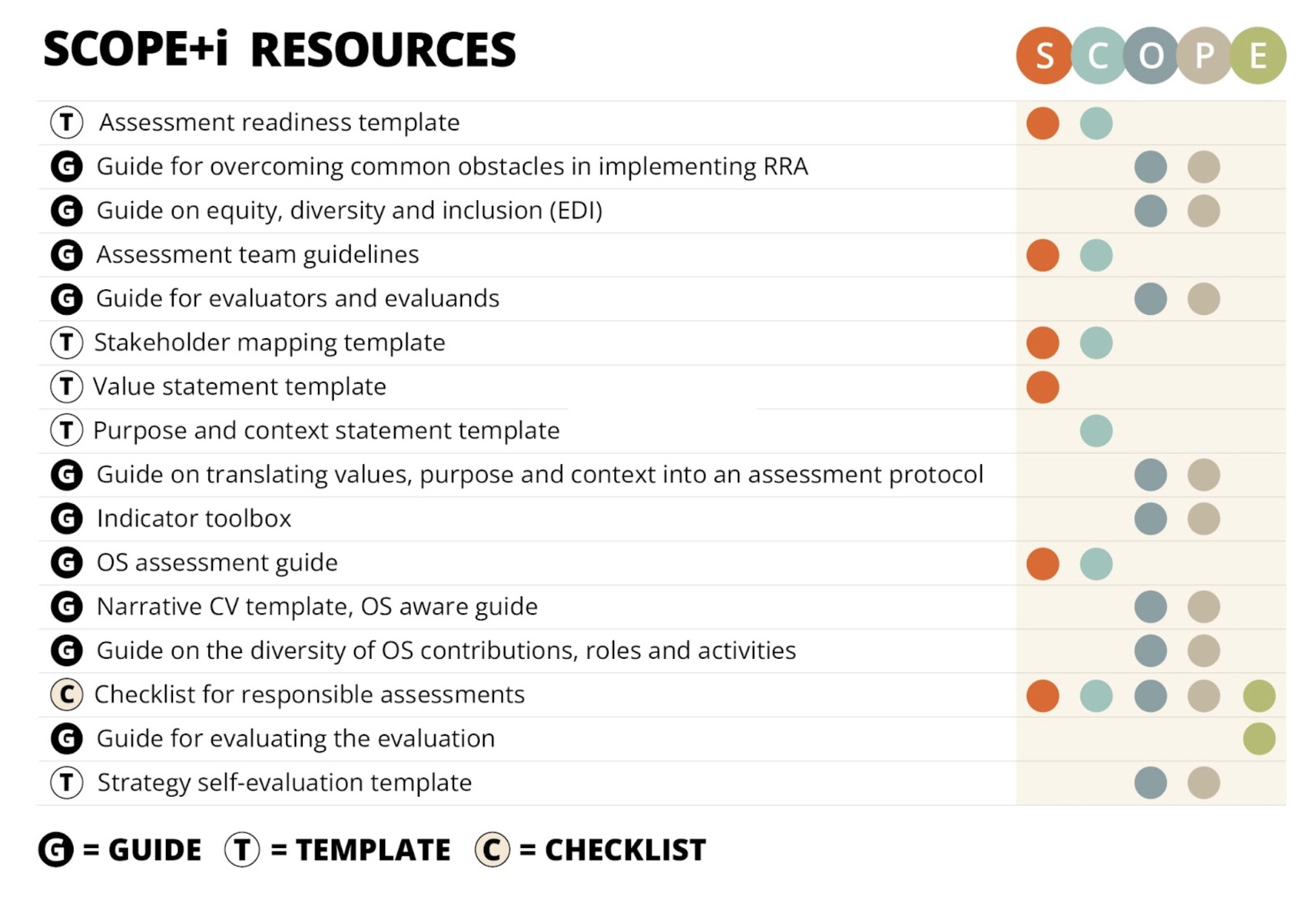SCOPE+i Framework



The GraspOS project has developed tailored infrastructure that works together with the existing SCOPE Framework, which is known as the SCOPE+i Framework. This assessment infrastructure consists of two main components: assessment process resources and digital services. The assessment process resources offer guidance for implementing key elements of Responsible Research Assessment (RRA), while the assessment digital services enable collaborative collection and sharing of assessment plans and documentation throughout the entire assessment process.
The SCOPE+i Framework is designed to support the transition to Responsible Research Assessment (RRA), with a particular emphasis on contributions to Open Science (OS). By integrating process resources and digital services into the SCOPE Framework, the SCOPE+i Framework combines the flexibility required to plan and conduct RRA in diverse assessment contexts with practical tools for managing the complexities of research assessment reform.
In this framework, assessment processes refer to the activities involved in planning and carrying out research assessments. Assessment services refer to digital services aligned with modern interoperability standards for research information systems.
SCOPE+i Resources
The process resources are focused on operationalising the transition to RRA. This set of resources are provided in three formats; templates, guides, and checklists. Where possible, we adapt existing resources, such drawing from Royal Society Résumé for Researchers to develop guidance on employing an OS Narrative CV template. In some cases, the process resources extend SCOPE activities, such as providing a values statement template. In most cases however, the resources draw on insights from the GraspOS landscape analysis for OS aware RRA together with observations from the GraspOS pilots. The aim of the full set of process resources is to support the design and documentation of research assessment events, providing guidance toward operationalising RRA principles while respecting the flexibility needed to implement in local contexts.
These resources address:
- Different assessment phases: assessment readiness, assessment protocol, assessment execution, and assessment evaluation & dissemination
- With five SCOPE phases: Start with what you value, Context considerations, Options for evaluation, Probe deeply, and Evaluate your evaluation
- With Assessment infrastructure: Assessment portfolio, Assessment Registry and Openness profile.
Assessment process resources (Figure 1) have been created for each assessment phase. In total 16 resources – checklist, guides and templates - support the structured organisation of SCOPE process, which addresses initial planning through to the publication of assessment protocols. Resources can be used to support assessment of researchers and different types and sizes of research entities like research groups or organisations. All 16 practical resources will be openly published in Zenodo, in the GraspOS Assessment Process Resources community.
Figure 1: illustration of the checklists, guides, and templates in relation to the SCOPE phases.
SCOPE+i Services
The two services are an Assessment Protocol Portfolio for use during the full assessment event and an Openness Profile – a portfolio for making visible one’s contributions to OS. These services are part of the GraspOS Open Infrastructure and are technologically underpinned by the Research Activity Identifier, also known as RAiD. Adaptation of the RAiD for use in research assessment was developed in collaboration with the FAIRCORE4EOSC project.
As part of the broader GraspOS infrastructure, the SCOPE+i services offer three key advantages:
- Collaborative and Inclusive – Open to all assessment participants.
- Comprehensive Support – Accommodates all aspects of assessment planning, documentation, and final protocol development.
- Interoperable and Extensible – Built on a robust metadata schema and API, enabling direct data transfer to downstream analytic services.
Assessment Protocol Portfolio
The SCOPE+i Assessment Protocol Portfolio (APP) supports the planning and documentation of research assessment by serving two key functions: it records the agreed-upon approach for a specific assessment event and provides a means to register the assessment protocol after the event concludes. It acts as a shared resource for conducting the assessment and documenting its outcomes.
An APP is a collaborative, multi-actor digital object that brings together essential information for assessment planning—such as a readiness self-assessment, values statement, and purpose statement—along with the assessment protocol that outlines the assessment approach.
During the assessment, the portfolio is accessible ("locally open") to all participants involved in the event. It can also be made publicly available afterward, balancing transparency with the need for privacy during the process. This approach ensures consistency and clarity for both evaluators and those being assessed, while protecting sensitive information during the event.
After the assessment concludes, the APP can be archived for historical reference. Additionally, the assessment protocol itself—separate from any privacy-related content—can be published in the Assessment Protocols Registry. This allows the broader community to learn from the protocol's design in relation to its local context and stated purpose.
The Assessment Protocols Registry serves as a shared knowledge base to inform and inspire the design of future assessment events.
Openness Profile
The main ambition of the Openness Profile is to enable exposure of OS activities as an independent information entity, leading to a more diverse consideration of OS in research and related assessment.
The diversity of Open Science contributions is catered for through a flexible ingestion of different types of entries, including quantitative and qualitative information. Qualitative information is captured through narratives, which facilitate structured and evidence-based input in supporting research assessment.
A dedicated template for narrative CVs is being developed within the GraspOS project and will be made available for use in the piloting phase of the Openness Profile. The narratives can be supported by the Openness Profile, where evidence-based input can be inserted. Quantitative information is data that can be counted or measured in numerical values.

want to know
more?

